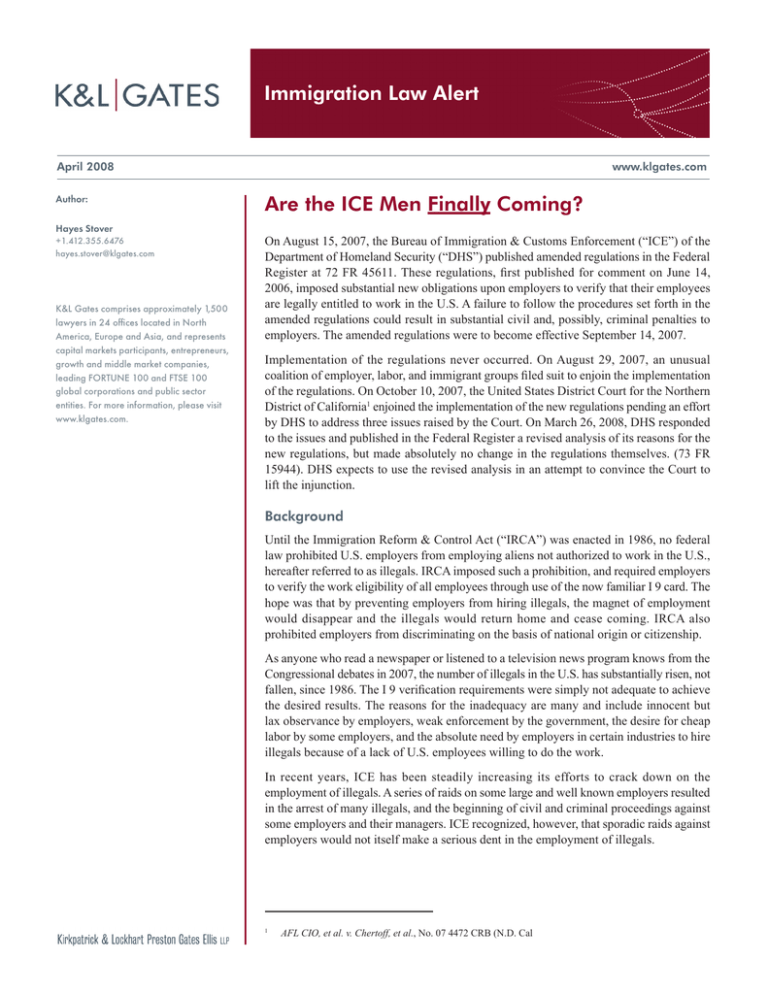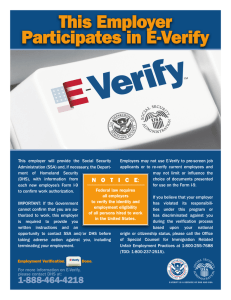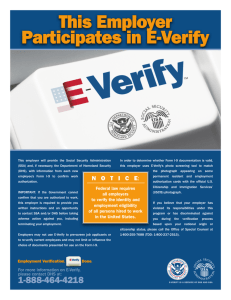
Immigration Law Alert
April 2008
Author:
Hayes Stover
+1.412.355.6476
hayes.stover@klgates.com
K&L Gates comprises approximately 1,500
lawyers in 24 offices located in North
America, Europe and Asia, and represents
capital markets participants, entrepreneurs,
growth and middle market companies,
leading FORTUNE 100 and FTSE 100
global corporations and public sector
entities. For more information, please visit
www.klgates.com.
www.klgates.com
Are the ICE Men Finally Coming?
On August 15, 2007, the Bureau of Immigration & Customs Enforcement (“ICE”) of the
Department of Homeland Security (“DHS”) published amended regulations in the Federal
Register at 72 FR 45611. These regulations, first published for comment on June 14,
2006, imposed substantial new obligations upon employers to verify that their employees
are legally entitled to work in the U.S. A failure to follow the procedures set forth in the
amended regulations could result in substantial civil and, possibly, criminal penalties to
employers. The amended regulations were to become effective September 14, 2007.
Implementation of the regulations never occurred. On August 29, 2007, an unusual
coalition of employer, labor, and immigrant groups filed suit to enjoin the implementation
of the regulations. On October 10, 2007, the United States District Court for the Northern
District of California1 enjoined the implementation of the new regulations pending an effort
by DHS to address three issues raised by the Court. On March 26, 2008, DHS responded
to the issues and published in the Federal Register a revised analysis of its reasons for the
new regulations, but made absolutely no change in the regulations themselves. (73 FR
15944). DHS expects to use the revised analysis in an attempt to convince the Court to
lift the injunction.
Background
Until the Immigration Reform & Control Act (“IRCA”) was enacted in 1986, no federal
law prohibited U.S. employers from employing aliens not authorized to work in the U.S.,
hereafter referred to as illegals. IRCA imposed such a prohibition, and required employers
to verify the work eligibility of all employees through use of the now familiar I 9 card. The
hope was that by preventing employers from hiring illegals, the magnet of employment
would disappear and the illegals would return home and cease coming. IRCA also
prohibited employers from discriminating on the basis of national origin or citizenship.
As anyone who read a newspaper or listened to a television news program knows from the
Congressional debates in 2007, the number of illegals in the U.S. has substantially risen, not
fallen, since 1986. The I 9 verification requirements were simply not adequate to achieve
the desired results. The reasons for the inadequacy are many and include innocent but
lax observance by employers, weak enforcement by the government, the desire for cheap
labor by some employers, and the absolute need by employers in certain industries to hire
illegals because of a lack of U.S. employees willing to do the work.
In recent years, ICE has been steadily increasing its efforts to crack down on the
employment of illegals. A series of raids on some large and well known employers resulted
in the arrest of many illegals, and the beginning of civil and criminal proceedings against
some employers and their managers. ICE recognized, however, that sporadic raids against
employers would not itself make a serious dent in the employment of illegals.
1
AFL CIO, et al. v. Chertoff, et al., No. 07 4472 CRB (N.D. Cal
Immigration Law Alert
With that in mind, the 2006 regulations proposed
new self enforcement obligations on employers. The
new regulations rest upon two premises. First, every
individual in the U.S. who is employed is required
to have a social security number for tax reporting
purposes. Employers use these numbers when
submitting wage, tax, and social security reports to
the government. Unfortunately, the use of false or
stolen social security numbers is easy and rampant.
The Social Security Administration (“SSA”) has for
many years sent employers communications when
the social security number used for an employee does
not match the information in the system. These “no
match” letters were intended to prompt employers
to resolve the discrepancy. However, the obligations
and penalties on employers receiving the no match
letters were weak to non-existent. Past no match letters
specifically provided that the letter was not a basis for
firing an employee, and that the letter did not mean that
the individual was not authorized to work. Uncertainty
existed as to what, if any, action an employer which
received a letter was to take.
Second, IRCA and its implementing regulations
prohibit the “knowing” hiring or retention of illegals.
Knowing includes not only actual knowledge but also
“constructive knowledge” that may be fairly inferred
through awareness of facts and circumstances which
would lead a person by use of reasonable care to know
about a situation. 8 C.F.R. § 274a.1(l). Under pre
amendment regulations, constructive knowledge can
be inferred from an employer’s failure to comply with
the I 9 requirements, or by showing that the employer
had available information showing that the individual
was an illegal.
The new regulations marry those two factors by using a
failure to properly respond to the receipt of a no match
letter to create a new basis for inferring constructive
knowledge.
The New Regulations
The new regulations add to § 274a.1(l) by providing
that constructive knowledge may be inferred when an
employer fails to take reasonable steps to verify status
after receiving notice from SSA that reported earnings
on an employee’s name and social security number
fail to match agency records or after receiving notice
from DHS (after DHS has conducted an audit of the
employer’s I 9s) that the I 9 supporting documents are
not valid, or were issued to another individual.
The new regulations then proscribe how the employer
can avoid a finding of constructive knowledge based
upon receipt of such a letter, so called “safe harbor”
actions. The regulations provide that the employer
who receives an SSA letter can avoid a constructive
knowledge inference by taking the following steps:
a. Within 30 days after receipt of the letter, check to see
whether the employer has committed clerical error
and if so, notify SSA with the correct information
and verify with SSA that the new information is
correct. The steps should be noted on the old I 9 or
on a new I 9, but the employer should not otherwise
re verify the I 9 information.
b. If no clerical error is found, the employee must be
promptly asked to verify the information given. If
the employee states that the records are incorrect,
the employer must correct, inform, verify, and make
a record as noted above.
If the employee maintains that the records are correct,
the employee is directed to resolve the discrepancy
with SSA. The employee is to resolve the discrepancy
within 90 days of the date the employer received the
letter.
If the employee is unable to resolve the issue with
SSA within 90 days, the employer must within three
additional days re verify employment authorization
by completing a new I 9. However, in the new I 9
processing, the employer cannot accept, despite
the document being listed on the I 9 instructions as
acceptable, any document challenged in a letter from
SSA or DHS, any disputed social security number
or alien registration number, or any receipt for an
application for replacement of a document which
would establish employment authorization or identity.
In addition, any new document presented to establish
identity, or identity and work authorization, must
contain a picture of the employee.
An employer who receives a written notice from DHS
rather than from SSA must contact DHS and attempt
to resolve the questions raised. This step must be
completed within 30 days after receipt of the letter.
If the employer cannot verify with DHS within 90
days of the receipt of the letter that the documentation
questioned by DHS is valid, the employer must
complete a new I 9 as described above.
April 2008 | 2
Immigration Law Alert
In summary, an employer who receives an SSA or a
DHS letter and takes the required steps is protected
against a subsequent inference of constructive
knowledge based upon receipt of the letter. An
employer who does not take the required steps and
continues to employ the employee in question may at
a subsequent time be found to have had constructive
knowledge that the employee is illegal if in fact the
employee is illegal.
The Court’s Concerns and DHS’s
Response
The District Court raised three specific objections to
the revised regulations: (1) DHS failed to provide a
reasoned analysis of what the Court felt was a change
in DHS’s position that receipt of a no match letter
may now be sufficient by itself to put an employer
in a position of having constructive notice of a
hiring violation; (2) DHS exceeded its authority and
encroached on the Department of Justice (DOJ) in
interpreting the anti-discrimination provisions of
IRCA, a function given to DOJ; and (3) DHS violated
the Regulatory Flexibility Act by not conducting a
regulatory flexibility analysis.
DHS addressed the three concerns as follows:
1. DHS noted that no match letters go only to
employers whose wage reports contain eleven or
more no matches, and the no matches represent more
than 0.5% of the employer’s total W 2s. Likewise,
an ICE notice of suspect document is sent only after
ICE, following an audit, has been unable to confirm
the validity of an I 9 document. As noted earlier, pre
regulation statements from DHS and predecessor
agencies often gave the impression that receipt
of a no match letter did not provide constructive
knowledge of illegal status. The Court thought
that the new regulations changed that presumption
without a sufficient analysis. Although disagreeing
that its position had changed, DHS concluded that
it had ample reason to change its position and gave
reasons for the change, concluding that an employer
who received a no match letter had constructive
knowledge unless it reacted as set forth in the new
regulations.
2. IRCA prohibits discrimination based upon national
origin or citizenship. The original preamble to
the revised regulations opined that an employer
who followed the revised regulations would not
be found to have unlawfully discriminated. The
Court believed this position infringed upon DOJ’s
jurisdiction. DHS resolved this issue by simply
withdrawing its statements that an employer
which followed the revised regulations would not
be deemed to have discriminated. Accordingly,
whatever protection against discrimination charges
that the original preamble provided no longer
exists. However, in a rare coordination between
departments, on March 24, 2008, DOJ issued a
statement which said that if the procedures in the
regulations were followed and applied equally to all
employees for whom a no match letter was issued,
DOJ would not find discrimination.
3. DHS addressed the Regulatory Analysis issue by
purporting to conduct a Regulatory Flexibility
Analysis. The revised analysis addressed two
additional issues. First, it stated that the obligation to
“promptly” notify an employee that the discrepancy
could not be resolved through the employer’s own
records would be satisfied if notification was given
within five (5) business days after completing the
internal investigation. Second, the revised analysis
confirmed that an investigation of an employee
hired prior to November 6, 1986, the effective date
of IRCA, would not be required.
Observations and Conclusions
At this time, it is unclear whether DHS’s efforts
will result in the lifting of the injunction and the
implementation of the new regulations. If that happens,
the following observations can be made:
1. Compliance with the safe harbor provisions does
not guarantee that the employer will not be found
to have knowingly employed illegals, but provides
only that receipt of the letter will not be the basis for
inferring constructive knowledge if the procedures
are followed.
2. The regulations do not require the employer to
fire an employee about whom it receives a letter,
but continuing to employ the individual without
satisfactorily completing the proscribed steps may
lead to a finding of a knowing employment of an
illegal.
3. SSA does not send copies of no match letters to
ICE, but in any subsequent audit by ICE, questions
about the possible receipt of a letter will be raised.
April 2008 | 3
Immigration Law Alert
4. The regulations are unclear as to whether a letter
received prior to the effective date of the amended
regulations will trigger the obligations.
5. Many employers who cannot find an adequate
number of legal workers will be placed in a position
of either risking a finding of knowingly hiring
illegals, or having an inadequate work force.
8. Employers who terminate an employee based upon
receipt of a letter may be exposed to discrimination
charges and litigation, although the DOJ’s statement
will provide some measure of comfort.
We will continue to monitor and update the status of
this case, and the related implications.
6. If the new regulations cause enough pain, there will
be increased pressure in Congress to address the
current fractured and poorly functioning system for
employing aliens.
7. Illegals who now work “on the books” and pay
taxes may join the underground economy.
K&L Gates comprises multiple affiliated partnerships: a limited liability partnership with the full name Kirkpatrick & Lockhart Preston Gates Ellis LLP
qualified in Delaware and maintaining offices throughout the U.S., in Berlin, and in Beijing (Kirkpatrick & Lockhart Preston Gates Ellis LLP Beijing
Representative Office); a limited liability partnership (also named Kirkpatrick & Lockhart Preston Gates Ellis LLP) incorporated in England and
maintaining our London office; a Taiwan general partnership (Kirkpatrick & Lockhart Preston Gates Ellis - Taiwan Commercial Law Offices) which
practices from our Taipei office; and a Hong Kong general partnership (Kirkpatrick & Lockhart Preston Gates Ellis, Solicitors) which practices from
our Hong Kong office. K&L Gates maintains appropriate registrations in the jurisdictions in which its offices are located. A list of the partners in
each entity is available for inspection at any K&L Gates office.
This publication/newsletter is for informational purposes and does not contain or convey legal advice. The information herein should not be used
or relied upon in regard to any particular facts or circumstances without first consulting a lawyer.
Data Protection Act 1998—We may contact you from time to time with information on Kirkpatrick & Lockhart Preston Gates Ellis LLP seminars and
with our regular newsletters, which may be of interest to you. We will not provide your details to any third parties. Please e-mail london@klgates.
com if you would prefer not to receive this information.
©1996-2008 Kirkpatrick & Lockhart Preston Gates Ellis LLP. All Rights Reserved.
April 2008 | 4





